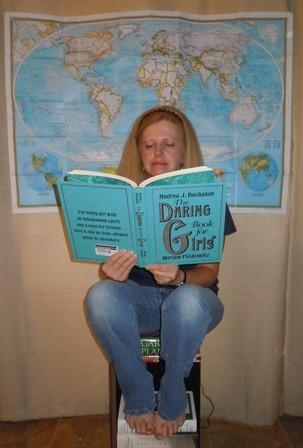Cheryl Hughes: Handout
On Friday afternoon at our work, a couple of vehicles pulled into our parking lot, the side that faces the convenience store next door. One was an RV, the other a van/bus. They were painted in multi-colored green and brown earth tones. The plates said Indiana. Barefoot young people piled out of the vehicles. They wore Nehru shirts, baggie pants and striped shorts in the same earth tones as their vehicles. Their hair was done up in dreadlocks, tied back in bandanas. It was like being transported back to the 1960s.
The young people weren’t customers of ours, they instead took empty gas cans over to the neighboring store then brought the filled cans back and poured the gas into the RV. I watched them do this several times before asking, “Why don’t they just pull into the service area and pump gas directly into the RV?” As I continued to watch, the answer became clear. They were approaching customers at the store and asking those people to buy the gas for them. It was remarkable how many people did just that.
As I watched this scenario play out, I thought, “Never in a million years would I do anything like travel around the country in an RV and ask people I had never met to pay for gas I had no intention of paying for myself—albeit, I did admire their fashion sense, I’ve always loved Hippie clothing.
My parents raised seven children, and every one of us believes in making our own way. After leaving the hospital for the second time, following issues related to the Covid-19 virus, my brother, Carl, wanted to get back to work. His wife, Susan, knows work for Carl is as essential to her husband as food, water and air. They run a sawmill together, so she knew she would be right beside him if anything went sideways. They work a few hours each day. When Carl becomes tired, they shut everything down and go to the house.
Garey’s dad was the same way. He would often tell his young grandchildren, “Come stay with me awhile, and I’ll teach you how to work.” He would turn over in his grave if he could hear his oldest grandson brag about how little he works and how much he gets paid for it. He is my nephew, and I love him dearly, but I have never understood that mentality. I have always been a 110 percent person, a day’s work for a day’s pay, and all that.
Garey and I taught our children to work. They had chores which they took little interest in and garden work they absolutely hated. Most kids hate garden work. I know I did when I was a kid. Recently, my granddaughter, Sabria, asked me to plant some green peas for her when I was putting out my other vegetables. It was really too late for them, but I went ahead with the project, planting them in one of the raised beds in my backyard. Almost immediately the weeds took over the small crop. One Saturday when she was staying at our house, I told her she needed to help weed the peas. Although she didn’t say anything while she was putting on her shoes, I could tell she wasn’t happy about it.
As we pulled weeds from around the peas, I told her what it was like for me to work in tobacco as a kid. She listened as I described the planting, the hoeing, the suckering, the cutting, the hauling, the hanging, the stripping and the taking to market. She never said anything, she just listened. I wanted her to understand that she wasn’t being picked on or punished, that work is just a part of life. If you want green peas, you have to pull out the weeds that are choking them.
In the book, TINKERS, one of the main characters, Howard, ended every prayer with, “And God let us perceive that there is nothing better than that a man should rejoice in his own work. Amen.”
I couldn’t have said it better.



























